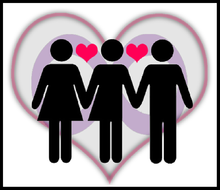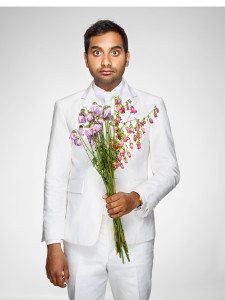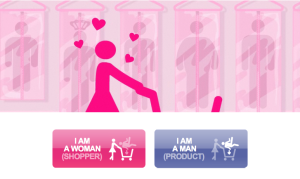Since my (thankfully short) foray into the online dating world, I’ve been a bit obsessed with understanding how people navigate relationships, not only in the dating world, but also in terms of committed partnerships. Call it an academic (but also personal and emotional) obsession.
Let me begin by putting all my cards on the table to better understand where I’m coming from. I’m a long-term, committed relationship sort of person. I loathe the casual, where-do-I-stand anxiety of new relationships. That being said, I don’t necessarily assume that others are like this nor do I wish to convince anyone to take up my own dating preferences.
 Anecdotally, I seem to keep bumping into people or stories about open relationships and polyamory. Certainly more than I had in the past. As a relationship style (with varying approaches, obviously), they seem to be all the rage these days. Perhaps they always were and are now they’re just more socially accepted. Or maybe I’ve just been out of the conversation too long. But let’s just pretend that my anecdotal interactions with polyamory represent some kind of objective reality (in other words, humor me).
Anecdotally, I seem to keep bumping into people or stories about open relationships and polyamory. Certainly more than I had in the past. As a relationship style (with varying approaches, obviously), they seem to be all the rage these days. Perhaps they always were and are now they’re just more socially accepted. Or maybe I’ve just been out of the conversation too long. But let’s just pretend that my anecdotal interactions with polyamory represent some kind of objective reality (in other words, humor me).
I’ve heard many justifications for engaging in this kind of relationship style, many of which do sound (even to me) perfectly rational and maybe even feasible. In many ways, it sounds like a reasonable response to one of the major challenges of a long-term committed relationship: sexual monogamy and the downswing of that oh-so-seductive passionate phase of a relationship. Of course, cheating always has and always will be one way people deal with these challenges. The problem with cheating, however, is not necessarily the infidelity or the act of having sex with someone other than your significant other. Rather, it’s the deception involved that can really challenge or kill a relationship.
 An open relationship, then, addresses this challenge directly by calling for the maintenance of trust through open communication about other (sexual/romantic) partners. It also allows for a continuation of those drug-like feelings of passion that come with new relationships. The excitement of attention from the opposite sex….the exhilaration of something new…This passion with others may even help maintain a long-term committed relationship with a primary partner.
An open relationship, then, addresses this challenge directly by calling for the maintenance of trust through open communication about other (sexual/romantic) partners. It also allows for a continuation of those drug-like feelings of passion that come with new relationships. The excitement of attention from the opposite sex….the exhilaration of something new…This passion with others may even help maintain a long-term committed relationship with a primary partner.
Caveat: I do realize not all polyamorous relationships are sexual in nature nor do they all involve “primary” versus “secondary” partners, but let’s just go on the assumption that many do function this way. Humor me.
On these points, an open relationship might be a viable option and a way to curb the dishonesty associated with “cheating”. After all, sexual infidelity is only cheating if the other person doesn’t know about it or doesn’t approve of it.
Even given the rationale for engaging in this type of relationship style, I continue to feel a little uneasy about it. At first I just assumed it was my personal preference for a single, committed partner. But then I ran across this article about Aziz Ansari’s new book (“Modern Romance”). What the article reminded me of was the “paradox of choice” that comes with modern dating practices (namely, online dating).
During my stint of online dating, I was uncomfortable with the whole “shopping” feeling that online dating sites like OkCupid have and realized just how easy it would be to fall into the trap referred to as the “paradox of choice”. Online dating sites, especially OKC or Tinder) give the impression that there are tons of options out there, tons of single people looking to date. In a sea of choices, it’s easy to pass on people who don’t fit the details of our imagined partner.
Wears glasses? Pass.
Loves cats? Pass.
It’s easy to get caught up in the idea that there are always more options out there… so why settle?
The reality is, we miss out on a lot of potential matches when we single out details that seem to be important to our overactive imaginations and our constructed idea of a “perfect” partner. In reality, there’s so much we can’t know about another person from simply looking at a limited number of pictures, reading super selective snippets about them, or even corresponding electronically. Maybe what we originally thought would be a problem turns out to be a minor blemish on an otherwise great match? Why cut off a potential match because of trivial details?
Because we can. And because it seems more efficient than going through the hard work of actually meeting people before coming to conclusions about them.
Due to the perception of choice, then, we may unintentionally limit our options and perhaps even sabotage our chances of finding success (whatever success might mean to any given individual). This leads to a lot of bad reviews of the whole online dating process. There’s certainly no shortage of negativity surrounding online dating. According to one blog writer, “If you define online dating success with how many dates you get or how many year long relationships you have, you’re setting yourself up for failure. Nowadays, the success is in not wanting to chew your arm off, quitting or giving up.”
What does all this have to do with polyamory you ask? Thanks for asking! As a relationship style, polyamory and open relationships also have the potential to suffer from this paradox of choice, albeit in potentially different ways. Polyamorous couples are given a wider range of choice and options in their romantic lives. It also gives them the chance to re-up the drug effect of passion without the dishonesty that comes with cheating.
But can it be successful? Okay, no, I’m not going to answer that one. It’s obviously not my place to say because I think it really depends on the couple. In theory it seems like it could work for couples that are utterly and completely open and honest with one another. Even in those instances when a couple is open and honest enough, jealousy may still be a challenge. Navigating that jealousy can be difficult. Hell, navigating a relationship based on open honesty is difficult in and of itself. I think the thing many people underestimate (and perhaps leads to the downfall of some open relationships) is the human emotional component and the work it takes to actually make a relationship functional. An open relationship, in this way, seems to lessen the burden of some stresses that may cause problems in long-term committed relationship, but it seems to add other stresses, in my opinion.
One of those stresses, I would argue, is the effect that choice and options might have on how one partner understands and feels about their primary partner. How can those new encounters (however fleeting or long-lasting) NOT effect the partnership? The effect might be positive (appreciating one’s primary relationship more) but it might also be negative (connecting more strongly to a different partner in which case the primary partnership might suffer). Just the idea that there are seemingly unlimited sexual/romantic options out there may make someone less likely to commit fully to the primary relationship. It might just be easier to leave than to spend the time communicating, understanding and otherwise dealing with a problem. Relationships of all kinds are not easy, including open/polyamorous ones.


